Director
- Mark Lythgoe
- Email: m.lythgoe@ucl.ac.uk
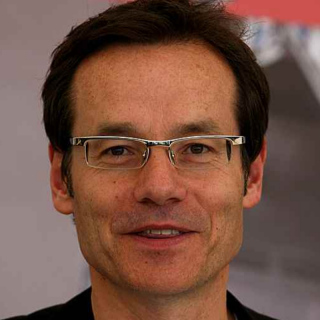
Phone: 02076796164Mark Lythgoe is the Founder and Director of the Centre for Advanced Biomedical Imaging (CABI). Mark is also Deputy Director of the UCL Department of Imaging and Director of Biomedical Imaging Research at the Francis Crick Institute. Mark has a long-standing track record in the development and application of biomedical imaging techniques and has been awarded £45 million for his collaborative programme of imaging research. He has published over 250 papers including publications in Nature, Nature Photonics, Nature Medicine and The Lancet. Mark has translated his research findings into clinical radiological practice and established a training programme with University College Hospital in biomedical imaging. He is Co-director of MSc in Advanced Biomedical Imaging and Co-founder the UCL Centre for Doctoral Training in Medical Imaging.
Mark is committed to the public engagement of science. During his tenure as Director of the Cheltenham Science Festival, it has become one of the largest science festivals in the world. In 2015 he was awarded the Neuroscience Prize for Public Understanding from the British Neuroscience Association, ‘as someone epitomising the best of public engagement. Through a multitude of TV and radio programmes, directing the Cheltenham Science Festival – alongside an active and highly successful research career – Mark has well and truly taken neuroscience beyond the lab and into wider society'. In 2013 Mark received the Davies Medal from the Royal Photographic Society for a significant contribution to the field of imaging science. Mark has also received the Alumni Achievement Award, which is given to the University of Salford’s most notable and successful graduates. For his contributions to communicating science, Mark has received the Biosciences Federation Science Communication Award and was made a Fellow of the British Science Association. In 2020, Mark received the Royal Society of Medicine Ellison–Cliffe Award, for his contribution of fundamental science to the advancement of medicine.
Laboratory Manager
- Tom Carson
Email: t.carson@ucl.ac.uk
Phone: 02031082041I oversee facilities management across the Centre for Advanced Biomedical Imaging labs. Duties include managing the safe use, maintenance and servicing of research facilities and equipment; monitoring risk and ensuring compliance with regulatory requirements; leading on goods and services procurement; administering research grant and core funding income and expenditure. I liaise directly with support staff across UCL and with external contractors, and I represent CABI at institution health & safety, logistics and operations meetings.
I co-lead the Advanced Biomedical Imaging MSc degree programme ‘Science Communication for Biomedicine’ teaching module.
Principal Investigators
- Simon Walker-Samuel
- Email: simon.walkersamuel@ucl.ac.uk
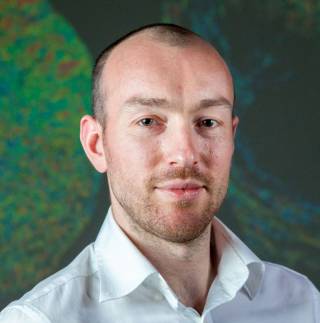
Phone: 020 7679 6329
My research focusses on the development of new imaging and mathematical modelling techniques in cancer, mainly using magnetic resonance imaging (MRI), three-dimensional optical imaging and machine learning.Digital tumour models
A principal thread within my work is to develop digital models of real-world tumours, using three-dimensional optical imaging (see d’Esposito et al, Nature Biomedical Engineering, 2018). By combining this approach with machine learning we are developing new imaging biomarkers with MRI to enable a more detailed understanding of tumour structure and function.
Imaging biomarker development
My research group has developed several new and innovative MRI imaging techniques, including VERDICT for measuring tumour cell size, noninvasively (Panagiotaki et al, Cancer Research, 2014), convectionMRI for evaluating slow fluid flows (Walker-Samuel et al, Cancer Research, 2018), glucoseCEST for monitoring tumour glucose uptake (Walker-Samuel et al, Nature Medicine 2013) and arterial spin labelling for vascular perfusion (Johnson et al British Journal of Cancer, 2016). This work has included collaborations with several pharmaceutical companies (Millennium-Takeda, AstraZeneca).
Image segmentation
We have developed several platforms for annotating and segmenting biomedical images, such as tUbeNet for three-dimensional blood vessel network detection (using deep convolutional neural networks). This is being used in a range of applications, including the characterisation of diabetic retinopathy (collaboration with Moorfields Eye Hospital and Zeiss).
Current funding source: HEFC
- Tammy Kalber
- Email: t.kalber@ucl.ac.uk
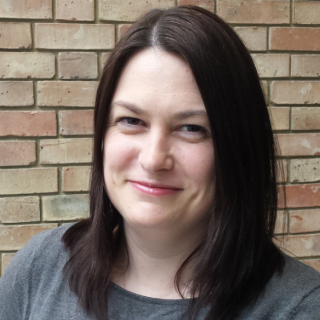
Phone: 020 7679 0810My work centres on developing innovative imaging techniques using nanochemistry and molecular engineering to monitor cell therapies in vivo. I intend to correlate quantitative delivery and localisation of cells, with the assessment of cell viability, in order to investigate the efficacy of cell therapies and predict their potential therapeutic outcomes. This work utilises two cell labelling strategies: direct labelling and genetic reporter labelling. Nanoparticles and low molecular weight compounds are used to directly label cells with imaging agents. With genetic reporter labelling, the cells are genetically modified to express a gene that can incorporate an imaging probe into viable cells. Combining these two techniques allows cells to be tracked and assessed in vivo using a multitude of different imaging platforms (MRI, PET/SPECT/CT, optical) across scale (whole body to micrometre range).
Projects
Cell therapies are advantageous in many diseases. My work has two main applications; 1) to monitor stem cells in models of regenerative medicine (UK Regenerative Medicine Platform Safety and Efficacy Hub) and as potential adjuvant cancer therapies; 2) to monitor immune cells when applied as immunotherapies, such as CAR-T cell therapies, or their role in regenerative medicine. - Jack A Wells
Email: jack.wells@ucl.ac.uk
I am passionate about the development of new and non-invasive MRI techniques to investigate brain function, with application to neurodegenerative disease. I am currently developing new imaging methods to assess the brain’s cerebrospinal fluid (CSF) mediated clearance systems (e.g Harrison et al., 2018 ELife; Ohene et al., 2019 Neuroimage), working towards improved techniques for early diagnosis and understanding of dementia.Current funding source: Wellcome Trust/Royal Society
- Daniel Stuckey
Email: d.stuckey@ucl.ac.uk
Phone: 02076796921
Research Summary
My research focuses on developing and applying novel multi-modality imaging approached for the investigation of cardiomyopathy and therapy. Using serial in vivo cardiac MRI, ultrasound and PET/SPECT/CT, I investigate the mechanisms that underlie cardiac disease and result in heart failure. My specific area of interest is cardiac regeneration through stem cell therapy and tissue engineering - an emerging research field which can benefit enormously from translatable basic science. My ongoing research into enhancement of stem cell retention, viability and differentiation, assessed in vivo using MRI, radionuclide, fluorescent and bioluminescent labelling of donor cells, can provide data essential to current clinical trials of stem cells.
Preclinical Cardiovascular Imaging
I lead Preclinical Cardiovascular Imaging within CABI, and develop novel and innovative imaging methods for investigating heart disease and stroke. I have established over fifty collaborative projects with leading researchers within UCL, the UK and internationally, and I am always keen to collaborate with enthusiastic scientists interested in utilizing the power of in vivo imaging in their research. I also lead Preclinical Cardiovascular Imaging at Imperial College's new Biological Imaging Centre.
Small Animal Stroke and Myocardial Infarction Service (SASMIS)
I manage a core service that will enable researchers to test their hypotheses in vivo in reproducible rodent stroke and myocardial infarction models. By aiding with study design and experimental expertise I believe SASMIS can facilitate interdisciplinary research projects and enhance the impact of basic research.
MSc in Advanced Biomedical Imaging
I am founder and co-Director of UCL's new MSc in Advanced Biomedical Imaging - a course which aims to train the next generation of innervation imaging scientists.
Biography
I am a British Heart Foundation Intermediate Basic Science Research Fellow and lead pre-clinical cardiovascular imaging at UCL's Centre for Advanced Biomedical Imaging (CABI) and at Imperial College's new Biological Imaging Centre. Prior to joining UCL in 2013, I worked with Prof. Michael Schneider at Imperial College London. I lead preclinical cardiac imaging for the National Heart and Lung Institute and investigated cell therapy, diffuse cardiac fibrosis, stress cardiomyopathy, hypertrophic cardiomyopathy and transgenic models of disease using MRI, ultrasound and optical tomography. I studied for my DPhil at The University of Oxford in the Laboratory of Prof. Kieran Clarke. During my PhD I used MRI to assess the benefits of stem cell therapy for the infarcted heart, tracked the location of iron mircosphere labelled bone marrow stromal cells and cardiac stem cells in the live heart over 16 weeks in vivo and performed extensive characterization of cardiac function after stem cell therapy and in transgenic models of heart disease, including hypertrophic and dilated cardiomyopathy and muscular dystrophy.- Ian Harrison
- Email: ian.harrison@ucl.ac.uk
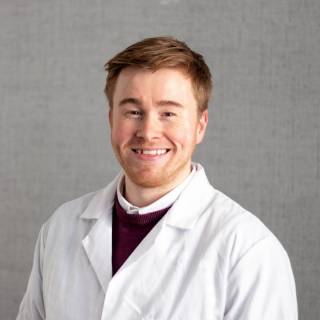
Phone: 02076796448
Neurodegenerative diseases, like Alzheimer’s and Parkinson’s, are associated with the accumulation of misfolded proteins in the brain. My research focusses on understanding the mechanisms by which these proteins build up and investigating ways in which we can target them therapeutically.Current Research Project – The Glymphatic System
The glymphatic system is an inherent clearance pathway in the brain which becomes active during sleep. We’re interested in whether failure of this pathway is involved in the build-up of protein products in the brain that define neurodegenerative disease. To investigate this we use imaging to study glymphatic clearance in mouse models of brain protein accumulation. Combining with molecular and cellular neuroscience techniques, our aim is to determine how and why impaired clearance pathways may lead to protein accumulation in the brain and the onset of neurodegenerative diseases.
Biography
I joined CABI as a postdoctoral researcher in 2014, having completed my PhD at Imperial College London under the supervision of Prof David Dexter, which focussed on novel epigenetic therapeutic strategies for the treatment of Parkinson’s disease pathology in a rat model. My initial post-doctoral work at CABI was focussed on leading a collaborative project between imaging scientists at CABI, and biomedical scientists at Eli Lilly, to develop and apply novel preclinical imaging methods for the assessment of Alzheimer’s pathology in the mouse brain. This led to later work aiming to understand the effects of Alzheimer-related protein aggregation on the brain’s glymphatic clearance pathway. I’m now a Senior Research Fellow at CABI, leading a group of researchers aiming to understand the involvement of this same brain clearance pathway in the accumulation of pathogenic proteins in the brain.
Current funding source: Alzheimer’s Research UK / Parkinson’s UK Research Fellowships
Research Fellows
Lecturers
Post Doctoral Researchers
- Annalisa Bettini
- Dunja Gorup
Email: d.gorup@ucl.ac.uk
- Saketh Karamched
Email: s.karamched@ucl.ac.uk
- Doug Lopes
Email: d.lopes@ucl.ac.uk
- Shereen Nizari
Email: shereen.nizari@ucl.ac.uk
- Yichao Yu
- Email: yichao.yu.10@ucl.ac.uk
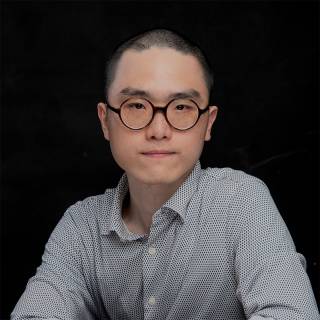
Phone: 02076796782I am a neuroscientist who is interested in developing and utilising novel technologies to remotely and precisely manipulate brain cells such as astrocytes with magnets and magnetic materials. In particular, I leverage the high-field magnetic resonance imaging (MRI) systems in the Centre for Advanced Biomedical Imaging (CABI) at University College London (UCL) to achieve imaging and actuation with a single device. My current research areas include astrocyte biology and brain cancer therapy.
Current funding source: Rosetrees Trust
Research Assistants
Francis Crick Institute Partners
- Bernard Siow
Head of MRI Facility
Email: b.siow@ucl.ac.uk
Phone: 02076796294- Peter Johnson
Head of In Vivo Imaging Research
Email: peter.johnson@crick.ac.uk- Thomas Snoeks
Senior Scientific Officer
Email: thomas.snoeks@crick.ac.uk
PhD Students
- Christopher Pope
Email: christopher.Pope.15@ucl.ac.uk
Phone: 02076796294
My PhD is in pre-clinical cardioregenerative therapy, looking at small particles stem cells release in culture (‘Extracellular Vesicles’). I am working to collect these from the cells, track them in vivo using different imaging technologies and identify whether they could be a potential treatment for myocardial infarctions/‘heart attacks’. My project is funded by the British Heart Foundation’s 4-Year PhD Programme and I am supervised by Dr Daniel Stuckey. I have a biochemistry and cell biology background so the advanced physics of some imaging techniques, such as MRI, are new to me but the range of modalities available in CABI is a great resource for my project.Current funding source: British Heart Foundation
- Natalie Holroyd
Email: natalie.holroyd.16@ucl.ac.uk
Phone: 02076796713
My PhD is focused on developing high resolution 3D imaging protocols for investigating tumours. Specifically, I work with High Resolution Episcopic Microscopy (HREM) – an optical imaging technique that can be thought of as automated 3D histology. HREM can reach resolutions on the micron scale over a large field of view, making it ideal for imaging tumour blood vessel networks. I’m also developing machine learning algorithms to extract these blood vessel networks from my images.Current funding source: EPSRC
- Phoebe Evans
Email: p.evans.16@ucl.ac.uk
Phone: 02076796295Current funding source: British Heart Foundation
- Charith Perera
Email: c.perera@ucl.ac.uk
I am currently working on developing and implementing a novel MRI technique for detecting early biomarkers of Alzheimer's Disease (AD) using functional imaging. This novel approach represents the only method to assess choroid plexus function non-invasively, and without exogenous contrast agents. There is future potential for using the technique to assess choroid plexus functionality in the human brain for the first time in a clinical setting, and could lead to a breakthrough in the early diagnosis and treatment of AD. To achieve this, it is important to refine and optimise this approach in a pre-clinical setting. This involves working on vascular reactivity challenges with various drugs, and studying changes in functionality of the blood-brain barrier and blood-CSF barrier in the aged brain and AD models.Current funding source: Royal Alzheimer’s Society
- Emmeline Brown
Email: emmeline.brown.16@ucl.ac.uk
- Shahrani Janudin
Email: shahrani.janudin.19@ucl.ac.uk
I am a PhD student in CABI. My interest is on multimodal imaging techniques for Myocardial Infarction and currently working on T1 mapping based on multiple flip angles using the 9.4T Bruker system.
Current funding source: MARA, Government of Malaysia
- Christina Katsiva
- Emily Lupton
Email: emily.lupton.19@ucl.ac.uk
- Zhiping Feng
Email: zhiping.feng@ucl.ac.uk
- Zekun Zhao
Email: zekun.zhao.17@ucl.ac.uk
- Lucie Gourmet
Email: lucie.gourmet.17@ucl.ac.uk
- Hannah Coleman
Email: hannah.coleman.21@ucl.ac.uk
- Sophie Llewellyn
- Yohn Taylor
Email: yohn.taylor.20@ucl.ac.uk
Artist in Residence
Previous Members
| ManKin Choy | Ruth Oliver | Tanja Holand |
| François Lassailly | Simon Richardson | Katy Ordidge |
| Rupinder Ghatrora | Adrienne Campbell | Niral Patel |
| Louise Kiru | James O'Callaghan | Da Ma |
| Miguel Goncalves | Adam Badar | Benjamin Sinclair |
| Panagiotis Kyrtatos | Kenneth Cheung | Jon Cleary |
| Niall Colgan | Ben Duffy | Francesca Norris |
| Inmaculada Villar | Johannes Riegler | Manil Chouhan |
| Nicholas Powell | Asif Machhada | Holly Holmes |
| Rajiv Ramasawmy | Anthony Price | Laurence Jackson |
| Arun Niranjan | Dr Angela d'Esposito | Valerie Taylor |
| Morium Ali | Tim Witney | Raul Pereira |
| Patrick McCormick | Hannah Greenwood | John Connell |
| Thomas Roberts | Isabel Christie | May Zaw Thin |
| Alice Romiti | Yanan Zhu | Paul Sweeney |
| Ben Hipwell | James Olav Breen-Norris | Ana Gomez Ramirez |
| Payam Nahavandi | Matin Mohseni | Heather Fitzke |
| Yolanda Ohene | Daniele Tolomeo | Adama Saccoh |
| Chris Payne | Nur Hayati Jasmin | Rebecca Baker |
 Close
Close

